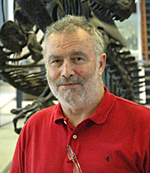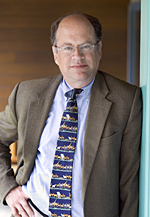

- Rozovsky wins prestigious NSF Early Career Award
- UD students meet alumni, experience 'closing bell' at NYSE
- Newark Police seek assistance in identifying suspects in robbery
- Rivlin says bipartisan budget action, stronger budget rules key to reversing debt
- Stink bugs shouldn't pose problem until late summer
- Gao to honor Placido Domingo in Washington performance
- Adopt-A-Highway project keeps Lewes road clean
- WVUD's Radiothon fundraiser runs April 1-10
- W.D. Snodgrass Symposium to honor Pulitzer winner
- New guide helps cancer patients manage symptoms
- UD in the News, March 25, 2011
- For the Record, March 25, 2011
- Public opinion expert discusses world views of U.S. in Global Agenda series
- Congressional delegation, dean laud Center for Community Research and Service program
- Center for Political Communication sets symposium on politics, entertainment
- Students work to raise funds, awareness of domestic violence
- Equestrian team wins regional championship in Western riding
- Markell, Harker stress importance of agriculture to Delaware's economy
- Carol A. Ammon MBA Case Competition winners announced
- Prof presents blood-clotting studies at Gordon Research Conference
- Sexual Assault Awareness Month events, programs announced
- Stay connected with Sea Grant, CEOE e-newsletter
- A message to UD regarding the tragedy in Japan
- More News >>
- March 31-May 14: REP stages Neil Simon's 'The Good Doctor'
- April 2: Newark plans annual 'wine and dine'
- April 5: Expert perspective on U.S. health care
- April 5: Comedian Ace Guillen to visit Scrounge
- April 6, May 4: School of Nursing sponsors research lecture series
- April 6-May 4: Confucius Institute presents Chinese Film Series on Wednesdays
- April 6: IPCC's Pachauri to discuss sustainable development in DENIN Dialogue Series
- April 7: 'WVUDstock' radiothon concert announced
- April 8: English Language Institute presents 'Arts in Translation'
- April 9: Green and Healthy Living Expo planned at The Bob
- April 9: Center for Political Communication to host Onion editor
- April 10: Alumni Easter Egg-stravaganza planned
- April 11: CDS session to focus on visual assistive technologies
- April 12: T.J. Stiles to speak at UDLA annual dinner
- April 15, 16: Annual UD push lawnmower tune-up scheduled
- April 15, 16: Master Players series presents iMusic 4, China Magpie
- April 15, 16: Delaware Symphony, UD chorus to perform Mahler work
- April 18: Former NFL Coach Bill Cowher featured in UD Speaks
- April 21-24: Sesame Street Live brings Elmo and friends to The Bob
- April 30: Save the date for Ag Day 2011 at UD
- April 30: Symposium to consider 'Frontiers at the Chemistry-Biology Interface'
- April 30-May 1: Relay for Life set at Delaware Field House
- May 4: Delaware Membrane Protein Symposium announced
- May 5: Northwestern University's Leon Keer to deliver Kerr lecture
- May 7: Women's volleyball team to host second annual Spring Fling
- Through May 3: SPPA announces speakers for 10th annual lecture series
- Through May 4: Global Agenda sees U.S. through others' eyes; World Bank president to speak
- Through May 4: 'Research on Race, Ethnicity, Culture' topic of series
- Through May 9: Black American Studies announces lecture series
- Through May 11: 'Challenges in Jewish Culture' lecture series announced
- Through May 11: Area Studies research featured in speaker series
- Through June 5: 'Andy Warhol: Behind the Camera' on view in Old College Gallery
- Through July 15: 'Bodyscapes' on view at Mechanical Hall Gallery
- More What's Happening >>
- UD calendar >>
- Middle States evaluation team on campus April 5
- Phipps named HR Liaison of the Quarter
- Senior wins iPad for participating in assessment study
- April 19: Procurement Services schedules information sessions
- UD Bookstore announces spring break hours
- HealthyU Wellness Program encourages employees to 'Step into Spring'
- April 8-29: Faculty roundtable series considers student engagement
- GRE is changing; learn more at April 15 info session
- April 30: UD Evening with Blue Rocks set for employees
- Morris Library to be open 24/7 during final exams
- More Campus FYI >>
7:20 a.m., Oct. 12, 2009----Francois Morel, Albert G. Blanke Jr. Professor of Geosciences at Princeton University, and William H. Schlesinger, president of the Cary Institute of Ecosystem Studies, will present scientific talks during the official launch of the Delaware Environmental Institute (DENIN) at the University of Delaware's Mitchell Hall in Newark, Del., on Friday, Oct. 23.
Schlesinger will delve into the practical application of discovery research in ecosystem science and biogeochemistry in his talk, “How Can Studies of Ecosystem Science and Biogeochemistry Help Solve Environmental Problems?”
Morel, who will give a talk titled “Acidification of the Oceans,” focuses on surface chemistry and photochemistry of trace elements in natural waters and biogeochemical cycles of nutrients and trace elements in his research.
“It is an honor to have Francois Morel and Bill Schlesinger speak at the DENIN opening,” said Donald Sparks, director of the Delaware Environmental Institute. “They are world-class scientists who have made seminal contributions in the areas of climate change and nutrient and metal cycling in terrestrial and aquatic environments.”
Schlesinger has investigated the link between environmental chemistry and global climate change for more than 30 years. He is the author or coauthor of more than 180 scientific papers. His recent work focuses on understanding how trees and soil influence atmospheric carbon dioxide levels.
Schlesinger's research results have been featured on NOVA, CNN, and NPR and in Discover, National Geographic, The New York Times, and Scientific American. His textbook, Biogeochemistry: An Analysis of Climate Change, is widely used at the university level.
As part of his committment to bridging the divide between science and policy, Schlesinger has testified before U.S. House and Senate Committees on environmental issues such as desert habitat preservation, global climate change and carbon sequestration.
An elected member of the National Academy of Sciences and the American Academy of Arts and Sciences, president of the Ecological Society of America from 2003-2004 and an Aldo Leopold Leadership Fellow in 1999, Schlesinger serves on the boards of the Doris Duke Charitable Foundation, the Southern Environmental Law Center and TerraPass, Inc.
Before joining the Cary Institute, Schlesinger served in a dual capacity at Duke University as the James B. Duke Professor of Biogeochemistry and the Dean of the Nicholas School of the Environment and Earth Sciences.
Morel joined the faculty at Princeton University in 1994 and has served as director of the Princeton Environmental Institute. He is the author or coauthor of more than 200 scientific papers and book chapters and the author of a widely used textbook, Principles and Applications of Aquatic Chemistry.
Before he joined Princeton University, Morel was a faculty member at the Massachusetts Institute of Technology from 1973-94, where he also served as the director of the R.M. Parsons Laboratory. He has served as visiting scientist at Woods Hole Oceanographic Institution, Ecole Normale Supérieure, University of Paris, University of Louis Pasteur and the Swiss Federal Institute of Technology.
Morel teaches courses in aquatic chemistry, low temperature geochemistry, biogeochemical cycling, and surface processes and has advised and mentored 50 graduate students and postdoctoral researchers who are prominent in the fields of environmental engineering and geochemistry.
Morel's honors include membership in the U.S. National Academy of Sciences; Fulbright and Guggenheim Fellowships; the C.C. Patterson Medal from the Geochemical Society; the Maurice Ewing Medal from the American Geophysical Union; Fellow of the Geochemical Society, the European Association for Geochemists, and the American Geophysical Union; the Urey Medal from the European Association for Geochemists and a Distinguished Alumni Award from the California Institute of Technology.
Morel serves on journal editorial boards; National Research Council advisory committees; and visiting scientific committees at the Swiss Federal Institute, the California Institute of Technology, Hebrew University, and the Ohio State University.
About the Delaware Environmental Institute
DENIN will support cutting-edge environmental research in areas relevant to challenges facing the state and the nation, and Institute research will inform decision makers by providing the knowledge that can help create sound environmental policies.
The institute fosters a culture of scholarship that leverages the combined talents of affiliates and fellows through collaborative working groups, joint proposal development and, where synergistic, project resource coordination.
The institute's goals are to initiate interdisciplinary research projects that integrate environmental science, engineering, and policy; support interdisciplinary academic programs; forge partnerships among government agencies, nonprofits, industry, policymakers, and the public to address environmental challenges; and coordinate and sponsor University-based interdisciplinary initiatives.
Article by Katie Ginder-Vogel


